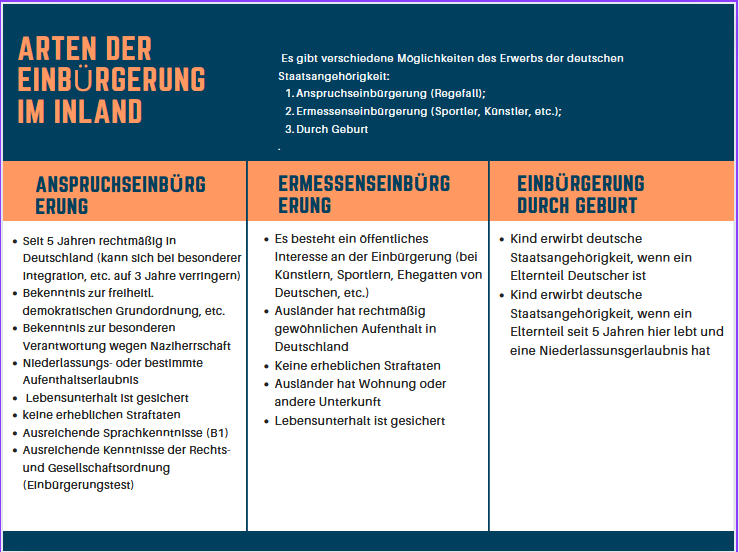Bavarian Administrative Court, Decision of 14.10.2016, Case No.: 5 C 16.664
Naturalisation and the naturalisation procedure are regulated in the Citizenship Act (StAG). According to Section 10 Para. 1 StAG, a foreigner who has been legally resident in Germany for five years and is capable of acting in accordance with Section 37 Para. 1 S. 1 StAG or is legally represented is to be naturalised upon application, provided they fulfil the requirements specified in Section 10 StAG. A core requirement of Section 10 StAG is therefore that the foreigner has their habitual residence in the Federal Republic of Germany.
In the following appeal procedure regarding the granting of legal aid, the substantive question is whether studying constitutes a shift in the center of one’s life.
Facts of the Case:
The plaintiff lived in Germany but studied business administration in Vienna.
The plaintiff was born in Germany in 1988 as a Turkish national and now seeks legal aid for an obligation to be naturalized.
The plaintiff has been studying business administration at the University of Vienna since October 2010 and has an apartment there. On 22.12.2014, the immigration authority granted her a period to re-enter Germany without losing her permanent residence permit until 31.03.2017 for a longer stay abroad. After the plaintiff applied for naturalization, she was informed by decision dated 10.11.2015 that it was assumed she no longer had her habitual residence in Germany. By 08.12.2015, the plaintiff did not provide any evidence to suggest otherwise.
Authority Rejected Naturalization Because Plaintiff Did Not Have Her Habitual Residence in Germany
On 15.01.2016, the defendant rejected the naturalization application, stating that the plaintiff had not provided evidence that she had her habitual residence in Germany. The plaintiff filed a lawsuit against this decision, arguing that she was only in Vienna for her studies for a maximum of four months a year and otherwise lived with her family in Augsburg. She sought legal aid for her lawsuit and the assignment of a lawyer.
The Administrative Court denied the application for legal aid, noting that the lawsuit had no sufficient prospect of success since the plaintiff had not provided evidence of her habitual residence. The plaintiff appealed against this decision and submitted a residence overview as well as affidavits from her family members and a neighbor.
Decision of the Bavarian Administrative Court
The appeal was admissible and well-founded. The plaintiff was entitled to the granting of legal aid and to the assignment of her lawyer for the lawsuit in the first instance (Section 166 VwGO in conjunction with Sections 114 ff. ZPO).
The action for an obligation to naturalize had a sufficient prospect of success. A certain, not necessarily overwhelming, likelihood of success was sufficient for the granting of legal aid. On the one hand, it was not necessary for the outcome of the process to be certain for legal aid to be granted. On the other hand, legal aid could be refused if success on the merits was not entirely excluded, but the chances of success were only slight (BVerfG – 2 BvR 94/88).
The basis of the asserted claim was Section 10 (1) sentence 1 StAG. According to this, a foreigner who has had their habitual residence in Germany for eight years is to be naturalized upon application if the conditions listed in numbers 1 to 7 are met. A foreigner has their habitual residence in Germany if they live in Germany not only temporarily but for an indefinite period, and the end of their stay is uncertain.
According to the Bavarian Administrative Court, it was not certain from the outset that the studies had led to the end of the stay in Germany.
The effects of studying abroad on habitual residence within the meaning of Section 10 (1) sentence 1 StAG raise difficult factual and legal questions.
In its case law on Section 51 (1) No. 6 AufenthG old version, the Federal Administrative Court assumed that a foreigner who completed a full university degree abroad rather than just part of their education left Germany for a reason that was not temporary (BVerwG – 1 C 15.11 – for a three-year study). This assumption derived from the idea that starting a full course of study would shift the center of one’s life to the place of study. This case law has been applied by the deciding Senate to habitual residence within the meaning of Section 4 (3) sentence 1 No. 1 StAG (BayVGH – 5 B 14.2090). The conditions under which the assumption of a shift in the center of life abroad can be refuted have not been definitively clarified in the case law. In any case, it is not possible to specify an abstract time period beyond which a non-temporary reason would always be assumed.
This Question Must Be Examined Again in the Main Proceedings
As a result, the question of the plaintiff’s habitual residence is currently open and must be clarified in the main proceedings. The plaintiff’s legal position that her studies in Vienna, due to the overall circumstances, did not lead to a shift in her center of life abroad seems at least tenable. The authorities and the administrative court also assumed that the shift in the center of life to the place of study was a presumption that could be rebutted based on the actual circumstances of the case. Due to the evidence now submitted, it is at least necessary to conduct an evidentiary hearing, which could support the argument for not shifting the center of life based on the overall circumstances.
The subjective requirements for granting legal aid were met according to the declaration on the plaintiff’s personal and financial circumstances submitted to the Administrative Court.

Source: Bavarian Administrative Court
Important Note: The content of this article has been prepared to the best of our knowledge and belief. However, due to the complexity and constant evolution of the subject matter, we must exclude liability and warranty. Important Notice: The content of this article has been created to the best of our knowledge and understanding. However, due to the complexity and constant changes in the subject matter, we must exclude any liability and warranty.
If you need legal advice, please feel free to call us at 0221 - 80187670 or send us an email to info@mth-partner.de
Lawyers in Cologne advise and represent clients nationwide in immigration law.



